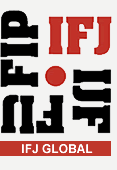
International Federation of Journalists (IFJ)
Fédération internationale des journalistes (FIJ)
Federación Internacional de Periodistas (FIP)
Internationale Journalisten-Föderation (IJF)
Search Open Yearbook
This information is part of the Open Yearbook, a free service of UIA's subscription-based Yearbook of International Organizations (YBIO). It includes profiles of non-profit organizations working worldwide in all fields of activity. The information contained in the profiles and search functionality of this free service are limited.
The full-featured Yearbook of International Organizations (YBIO) includes over 77,500 organization profiles, additional information in the profiles, sophisticated search functionality and data export. For more information about YBIO, please click here or contact us.
The UIA is a leading provider of information about international non-profit organizations. The aim of the Open Yearbook is to promote the activities of international non-governmental organizations (INGOs) and intergovernmental organizations (IGOs).
Contact Details
URL: https://www.ifj.org/
Twitter: https://twitter.com/IFJGlobal
Facebook: https://www.facebook.com/InternationalFederationofJournalists
Founded
1952-05-07 Brussels Belgium
History
Available with paid subscription only.Aims
Defend and enhance the working rights and conditions of journalists.
Events
65 past events available with paid subscription only.Activities
Available with paid subscription only.Structure
Available with paid subscription only.Languages
Available with paid subscription only.Staff
Available with paid subscription only.Finance
Available with paid subscription only.Registrations
Available with paid subscription only.Consultative Status
Available with paid subscription only.Relations with Inter-Governmental Organizations
Links with: E-XE2442 - European Commission (EC); B-XB2183 - ILO; F-XE2379 - International Programme for the Development of Communication (IPDC); E-XE7552 - United Nations Office at Vienna (UNOV).
- Member of: European Audiovisual Observatory
Relations with Non-Governmental Organizations
Links with:
- F-XF3974 - Africa Free Media Foundation;
- E-XN8457 - Association de la presse internationale (API);
- B-XM1784 - Building and Wood Workers' International (BWI);
- F-XE1463 - Central and Eastern European Media Centre Foundation (EMF-FCP);
- E-XE0141 - Confederation of ASEAN Journalists (CAJ);
- E-XE1745 - European Journalism Centre (EJC);
- D-XD6670 - Federación Latinoamericana de Periodistas (FELAP);
- D-XD4959 - Federation of Arab Journalists (FAJ);
- F-XF3406 - IFEX;
- B-XB1197 - International Association for Media and Communication Research (IAMCR);
- G-XG0820 - International Council for Human Rights (ICHR);
- C-XC1844 - International Federation of Actors;
- C-XC2681 - International Federation of Agricultural Journalists (IFAJ);
- G-XG6653 - International Institute of Journalism, Berlin - Brandenburg;
- F-XG9638 - International Media Support (IMS);
- G-XN0701 - International Research and Exchanges Board (IREX);
- A-XM2085 - International Trade Union Confederation (ITUC);
- D-XD2978 - Nordiska Journalistförbundet (NJF);
- B-XB2374 - Public Services International (PSI);
- F-XF5485 - Reporters sans frontières (RSF);
- E-XE3320 - Trade Union Advisory Committee to the OECD (TUAC);
- F-XF2663 - Transparency International (TI).
- Member of: Africa Freedom of Information Centre (AFIC)
- Member of: Federación Latinoamericana de Facultades de Comunicación Social (FELAFACS)
- Member of: Global Union Federations (GUF)
- Member of: International Federation of Reproduction Rights Organisations (IFRRO)
- Member of: Permanent Conference of Mediterranean Audiovisual Operators (COPEAM)
- Cooperates with: GRET
- Cooperates with: International Press Institute (IPI)
- Cooperates with: World Association for Christian Communication (WACC)
- Supports: South East European Network for Professionalisation of the Media (SEENPM)
- Instrumental in setting up: International News Safety Institute (INSI)
- Instrumental in setting up: Play the Game
Publications
Available with paid subscription only.Members
Available with paid subscription only.Type I Classification
Available with paid subscription only.Subjects *
UN Sustainable Development Goals **
UIA Org ID
XC1937
** UN SDGs are linked to the subject classification.
← return to your search page to find additional profiles.
UIA allows users to access and make use of the information contained in its Databases for the user’s internal use and evaluation purposes only. A user may not re-package, compile, re-distribute or re-use any or all of the UIA Databases or the data* contained therein without prior permission from the UIA.
Data from database resources may not be extracted or downloaded in bulk using automated scripts or other external software tools not provided within the database resources themselves. If your research project or use of a database resource will involve the extraction of large amounts of text or data from a database resource, please contact us for a customized solution.
UIA reserves the right to block access for abusive use of the Database.
* Data shall mean any data and information available in the Database including but not limited to: raw data, numbers, images, names and contact information, logos, text, keywords, and links.